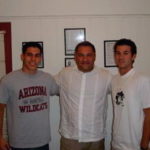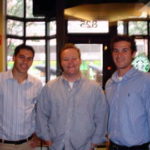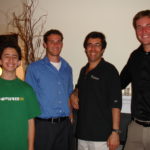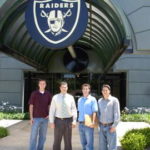I first saw Ford speak in September of ‘04, at a speech/workshop that I attended while a student at the University of Arizona. The workshop consisted of an enthusiastic Ford teaching writing basics to a majority crowd of journalism students, as well as talking about the New York Times. Somewhere during the speech he mentioned that if any of us were out in New York and wanted to stop by that we should show up around 5 PM. He explained that this is when they have their coffee break after deciding what will go in the paper the next day. I made a mental note and stored it somewhere in my memory bank.
 Flash forward to a Monday on Fourth of July weekend, when no one in their right mind is working. Looking for interviews, we managed to book one that morning at the Metropolitan Museum of Art, which was soon thereafter cancelled. I was beginning to feel that we had lost a day that we could be talking to interesting people. Remembering what Ford had said at the workshop, I dialed 411, asked for the New York Times and then Ford Burkhart. The phone rang, as they tend to do, and a familiar voice answered. The conversation went something like this:
Flash forward to a Monday on Fourth of July weekend, when no one in their right mind is working. Looking for interviews, we managed to book one that morning at the Metropolitan Museum of Art, which was soon thereafter cancelled. I was beginning to feel that we had lost a day that we could be talking to interesting people. Remembering what Ford had said at the workshop, I dialed 411, asked for the New York Times and then Ford Burkhart. The phone rang, as they tend to do, and a familiar voice answered. The conversation went something like this:
“Foreign Desk.” “Uh, yeah, hi is Mr. Burkhart there?”
“This is Ford.”
“Oh! Hi my name is Brett Farmiloe and I’m a student at the University of Arizona and”
“You’re not calling from the Alumni Association are you? You guys are always calling to ask me for money! Well, I have a meeting in a few minutes so make it quick.”
“Uh, actually I was just calling because I saw you speak a few months ago, and you gave a speech on effective writing. Anyway, in the speech you said that if any of us were ever in New York to stop by the Times and say hi. Well, we’re here! We are actually working on a project where we are interviewing people that have interesting careers that have a passion for what they do to see where they were at our age, how they got to where they are now, as well as some job related questions. Would you be interested in meeting with us today during your coffee break?”
And so it went. Ford was very enthusiastic about our project and impressed by our willingness to take the risk of cold calling him. All of the sudden we were rushing out of the Met Museum to catch a subway to the “Gray Lady,” also known as the New York Times.
We arrived at 229 W. 43rd St. and after a security check in, common to every building in New York City, we headed up to the 3rd floor. After a ten minute wait in the lobby, we were pointed in the direction of the Foreign section. There, we were greeted by a wide-eyed, copy editor responsible for covering events in Iraq, Israel, for America’s most prominent daily publication.
After making small talk, Ford took us on a tour of the Times. He noted that the business office is one of the largest in the newspaper industry because they have to compete with the Wall Street Journal. He was sure to point out the laid back culture of the Times. The business structure there is not the hierarchial structure that you might expect. Management’s responsibility is to make sure that the best and brightest are working at the Times, similar to a sports environment, writers are scouted and invited to be part of their team. The writers, many of whom are not journalism majors, are responsible for finding stories that hit a homerun with readers, day in day out. Overall, it is a very balanced office that has a horizontal philosophy, where everyone is equal.
Ford’s story began when he was a “dazed, sleepy-eyed freshman” back in the early 60’s, at the University of Arizona in Tucson. “Back then the only thing to do in Tucson was to drive up and down Speedway and drink milkshakes.” One day the young freshman was begrudgingly walking to class when he came across a teacher that encouraged him to enroll in his writing class. Curious as to why the teacher was so enthusiastic and passionate, Ford enrolled.
On the first day of class the teacher walked in and said, “Good morning, I’m Sherman Miller. On the board are your beats. I’ll see you Wednesday.” That was the end of class that day.
The only problem was that no one in the class knew what a “beat” was. Ford walked over to the board and saw his assignment, “Sports.” Assuming that he was supposed to get a “beat” for sports, he walked over to the McKale Center and uncovered an incredible story about a player trying to play football despite being diagnosed with a life-threatening disease.
So Ford wrote his story on the player, turned it in. He got the story back from Professor Miller who exclaimed that it was an extraordinary piece. From then on, Sherman Miller became Ford’s mentor. Ford responded by turning ordinary stories into exciting, adventurous write-ups.
Graduation came in 1963. Ford wanted nothing more to work at the New York Times. He wrote a letter to them saying he wanted to work, to which they answered, “we’ll keep in touch.” Ford did exactly that.
Over the next thirty years he kept in touch with people at the New York Times while teaching at the University of Arizona. In 1996 he expressed his lingering interest whie talking to a friend there at the Times. As it would turn out, the newspapaer had a copy editor position available. So Ford flew out to New York to start working at the place where he had dreamed of working since college.
Ford has been working at the Times for almost 10 years now and is planning on retiring soon. He is the copy editor for the Foreign Desk and gets to read all types of exciting stories written by reporters. Using a baseball analogy, his job is to turn doubles into homeruns. He is the third base coach, so to speak, who waves runners in for the score. Reporters write the stories, send them to the backfield editor. Fro mthere the stoires are sent to Ford’s desk. He is the last one to see them before the story goes in the paper.
Ford had lots of advice since he had years of experiencing teaching sleepy-eyed students like himself. Here are a few things he had to say:
“I believe that you meet a person and that person will have a large role in your life. It could be your friend, your wife, but for me it was my teacher, Sherman Miller. He thought me to believe in myself, that I could go from being a little green kid to what I wanted to be.”
The thing that I was able to take away from Ford was his philosophy of writing styles, and it has had an effect on the way I write. For example, he gave us his scenario of coming up with a title for a story, and started with a basic title of “Students Overcrowded at School in Brooklyn.” From there he went to “Schools Packed in Brooklyn” to his final title that I thought was so original and made a reader want to read to story. “Lunch at 10:17, Students are the Sardines.”
Ford made me realize that it takes a lor to make a story a home run, especially if its only a double. You have to be confident in your writing skills. The only way to do so, according to Ford, is to continue to writing. He advised that people should be excited about what they do.
“If you aren’t then you’re in the wrong type of business.”






